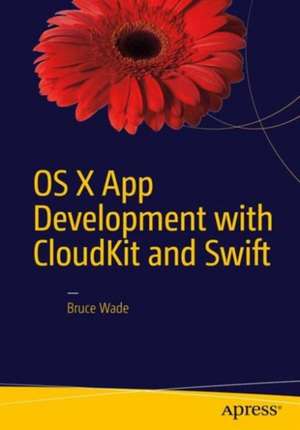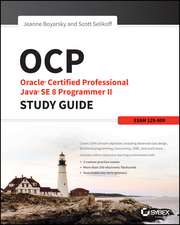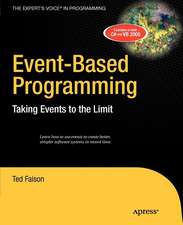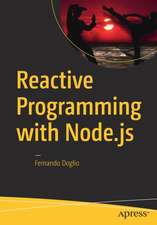OS X App Development with CloudKit and Swift
Autor Bruce Wadeen Limba Engleză Paperback – 27 mai 2016
This book is your step-by-step guide to learning OS X app development using CloudKit and Swift.
All the development will be done using Apple’s Swift 2 programming language. You'll see how to define data for your app and build a prototype with Sketch 3 and Keynote. Using CloudKit to store OS X application data, and separate public and private data, readers will learn how to control which data can or cannot be changed in a public data store. OS X App Development with CloudKit and Swift takes you from prototyping your app with Sketch 3 all the way through building a data-driven app using CloudKit, and everything in between.
All the development will be done using Apple’s Swift 2 programming language. You'll see how to define data for your app and build a prototype with Sketch 3 and Keynote. Using CloudKit to store OS X application data, and separate public and private data, readers will learn how to control which data can or cannot be changed in a public data store. OS X App Development with CloudKit and Swift takes you from prototyping your app with Sketch 3 all the way through building a data-driven app using CloudKit, and everything in between.
What You'll Learn
- How to create Test Data with CloudKit Dashboard
- How to refine a prototype
- How to update CloudKit Data from an app
- How to add Local Cache to improve performance
Who This Book Is For
OS X App Developmentwith CloudKit and Swift is for the iOS or OS X developer who is struggling to get to grips with CloudKit. If you’re looking for a solid example from start to finish using CloudKit with Swift 2 this book’s for you. You should have an understanding of the Swift language, e.g. the differences between var/let, how to work with control statements, closures etc., to work confidently with this book.
Preț: 183.04 lei
Preț vechi: 228.80 lei
-20% Nou
Puncte Express: 275
Preț estimativ în valută:
35.02€ • 36.57$ • 28.99£
35.02€ • 36.57$ • 28.99£
Carte disponibilă
Livrare economică 14-28 martie
Preluare comenzi: 021 569.72.76
Specificații
ISBN-13: 9781484218792
ISBN-10: 1484218795
Pagini: 149
Ilustrații: XIV, 131 p. 93 illus.
Dimensiuni: 178 x 254 x 12 mm
Greutate: 0.27 kg
Ediția:1st ed.
Editura: Apress
Colecția Apress
Locul publicării:Berkeley, CA, United States
ISBN-10: 1484218795
Pagini: 149
Ilustrații: XIV, 131 p. 93 illus.
Dimensiuni: 178 x 254 x 12 mm
Greutate: 0.27 kg
Ediția:1st ed.
Editura: Apress
Colecția Apress
Locul publicării:Berkeley, CA, United States
Cuprins
Chapter 1: Introduction
Chapter 2: Prototyping Our App
Chapter 3: Defining Our Data
Chapter 4: Introduction to CloudKit
Chapter 5: Creating Test Data with CloudKit Dashboard
Chapter 6: Refining Our Prototype
Chapter 7: Updating CloudKit Data From Our App
Chapter 8: Adding Local Cache to Improve Performance
Chapter 2: Prototyping Our App
Chapter 3: Defining Our Data
Chapter 4: Introduction to CloudKit
Chapter 5: Creating Test Data with CloudKit Dashboard
Chapter 6: Refining Our Prototype
Chapter 7: Updating CloudKit Data From Our App
Chapter 8: Adding Local Cache to Improve Performance
Notă biografică
Bruce Wade is a software engineer from British Columbia, Canada. He has started software development when he was 16 years old by coding his first website. He went on to study Computer Information Systems at DeVry Institute of Technology in Calgary, then to further enhance his skills he studied Visual & Game Programing at The Art Institute Vancouver. Over the years he has worked for large corporations as well as several start-ups. His software experience has led him to utilize many different technologies including C/C++, Python, Objective-C, Swift, Postgres, and JavaScript. In 2012 he started the company Warply Designed to focus on mobile 2D/3D and OS X development. Aside from hacking out new ideas, he enjoys spending time hiking with his Boxer, working out, and exploring new adventures.
Textul de pe ultima copertă
This book is your step-by-step guide to learning OS X app development using CloudKit and Swift.
All the development will be done using Apple’s Swift 2 programming language. You'll see how to define data for your app and build a prototype with Sketch 3 and Keynote. Using CloudKit to store OS X application data, and separate public and private data, readers will learn how to control which data can or cannot be changed in a public data store. OS X App Development with CloudKit and Swift takes you from prototyping your app with Sketch 3 all the way through building a data-driven app using CloudKit, and everything in between.
OS X App Development with CloudKit and Swift will show you how to:
All the development will be done using Apple’s Swift 2 programming language. You'll see how to define data for your app and build a prototype with Sketch 3 and Keynote. Using CloudKit to store OS X application data, and separate public and private data, readers will learn how to control which data can or cannot be changed in a public data store. OS X App Development with CloudKit and Swift takes you from prototyping your app with Sketch 3 all the way through building a data-driven app using CloudKit, and everything in between.
OS X App Development with CloudKit and Swift will show you how to:
- Create Test Data with CloudKit Dashboard
- Refine a prototype
- Update CloudKit Data from an app
- Add Local Cache to improve performance
Caracteristici
A definitive and practical guide to building apps using Cloudkit and Swift Ideal for developers who are struggling to get to grips with Cloudkit Everything is covered from initial build to improving performance











